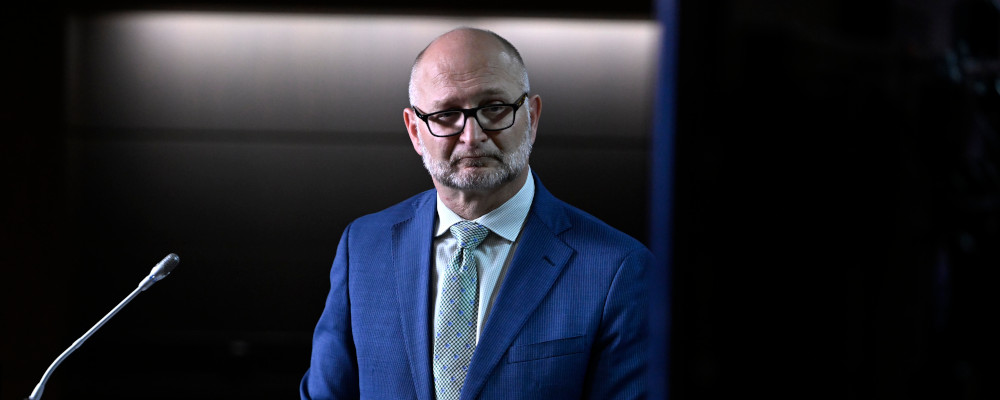Life and death decisions require explanations. Police officers who shoot a suspect need to explain why such action was necessary. Bus drivers or train conductors whose vehicles are involved in fatal collisions need to explain their split-second actions. Pilots who land planes in New York’s Hudson River also need to explain decisions that could have cost lives.
Justice ministers who change laws to help more Canadians end their lives aren’t making split-second decisions. But their judgement calls still carry the weight of life and death. They too need to explain themselves.
This applies to federal Justice Minister David Lametti. It’s why Cardus has called on him to explain his recent public comments on assisted suicide.
On November 18, Minister Lametti stated that doctor-assisted suicide (euphemistically known as medical assistance in dying, or MAiD) “provides a more humane way” for Canadians physically or mentally incapable of ending their own lives to do so. When asked if the state had a role in facilitating suicide, the minister answered that “because some have a right to do it, we can’t say to others you don’t have a right to do it simply because you’re physically incapable.”

Minister Lametti’s comments come as Canada hurtles toward one of the most permissive doctor-assisted suicide regimes in the world. By March 2023, the federal government could fling open the doors to doctor-assisted suicide for adults suffering from mental illness. And some are pushing the government to go further by making children eligible too.
Given the public policy context, the minister’s talk of “rights” and “humane” ways to end one’s life are not just philosophical chit-chat over beers. His words require clarity and explanation.
Minister Lametti could start by explaining on what basis he asserts a “right” to suicide.
At best, it would be a struggle to find such a right in the 2015 Supreme Court decision that struck down the criminal prohibition on assisted suicide. The justices found that an outright ban of “physician-assisted death for a competent adult person” who meets certain conditions was overly broad and infringes the guarantee of life, liberty, and security of the person. The conditions the court specified regarded a “grievous and irremediable medical condition” that was leading to “a reasonably foreseeable death.” That’s a far cry from establishing a right to suicide.
The minister’s own department clearly understands this. In its explanation for the bill that originally allowed doctor-assisted suicide, the Department of Justice noted the 2015 decision says nothing about doctor-assisted suicide for “minors or persons with psychiatric disorders or minor medical conditions.”
So, where does Minister Lametti base his comment? Has he misunderstood the court’s decision?
What about the specific case of mental illness, where death is not foreseeable and recovery is possible, though unpredictable? Does the minister see a right to suicide in those cases? The Association of Chairs of Psychiatry in Canada recently warned that the issue is complicated enough that Canada should delay its expansion of assisted suicide. Dozens of doctors signed a petition by the Society of Canadian Psychiatry also calling for a delay. These aren’t questions to be swept away with questionable assertions of rights.
The minister also needs to explain what he means by “a more humane way” of ending a life. The debate in Canada has always been about drawing a distinction between “MAiD” and suicide. Yet Minister Lametti seemed to erase any such distinction in his comments. Was this a slip of the mask, perhaps? Does the minister see a distinction, and if so, what is it?
As it stands, the minister doesn’t appear to consider all suicides as tragedies or as evidence of our collective failure to meet the needs of some of the most vulnerable people in Canada. An average of more than 10 people a day die by suicide in this country. Is Minister Lametti suggesting that efforts to prevent those suicides violate Canadians’ rights?
Ironically, the minister’s comments about “humane” ways to die are dehumanizing for so many of our neighbours, friends, and family.
Yet there’s still more Minister Lametti should explain, like his tacit acceptance that the state has a role in facilitating suicide (all while funding programs to prevent it). “MAiD” redefines medical care to include the deliberate ending of a life. How does the minister see that fitting into the primary objective of health care policy, as set out in the Canada Health Act, “to protect, promote and restore the physical and mental well-being of residents of Canada?” This primary objective would appear to recognize the dignity of the person at any and all stages of life; doctor-assisted suicide does not.
Does the minister genuinely see suicide as medical care? If so, does he appreciate the difficulty this causes for many medical practitioners who would be obligated to participate in providing suicide?
There is good anecdotal evidence that doctors and other medical professionals are leaving their professions because of the redefinition of medical care. Media have reported on the “lack of access” to assisted suicide because of the low numbers of doctors willing to participate. As those with mental illness begin requesting assisted deaths, those numbers will only increase. One group of doctors has been warning for years that assisted suicide “is not the medicine that we have devoted our lives to practicing.” What does the justice minister have to say to them?
Yes, Minister Lametti has a responsibility to explain his comments and his thinking. But it would be even better if he also reflected on the relevant, cultural question of human dignity.
The minister (and the Supreme Court) understand human dignity as the ability to exercise individual autonomy. This makes personal choice the highest good in society. So, patients determine whether their lives have value—and end them at will. But this isn’t true. Our dignity is innate to who we are as humans. It doesn’t depend on our ability to make choices. This is why infants, unconscious people, people with developmental disabilities, and those living in poverty have human dignity equal to those with the faculties or bank accounts to choose the course of their lives more directly. Dignity is neither contingent nor conditional and is independent of privilege or the ability to make choices. A society that understands this sees every life as valuable regardless of personal characteristics.
That’s something for the minister, and all of us, to consider. In the meantime, Minister Lametti has a responsibility to those he serves to clarify his public remarks. Questions of life and death deserve no less.
Recommended for You

Ginny Roth: J.D. Vance, Pierre Poilievre, and how they slice their economic pie

David Polansky: As President Biden leaves the race, will the Democratic Party hodgepodge hold?

Five Tweets on Western Canada’s devastating wildfires

RCMP spending to protect MPs may have risen 112% since 2018, as Canadian politicians face greater rise in threats









